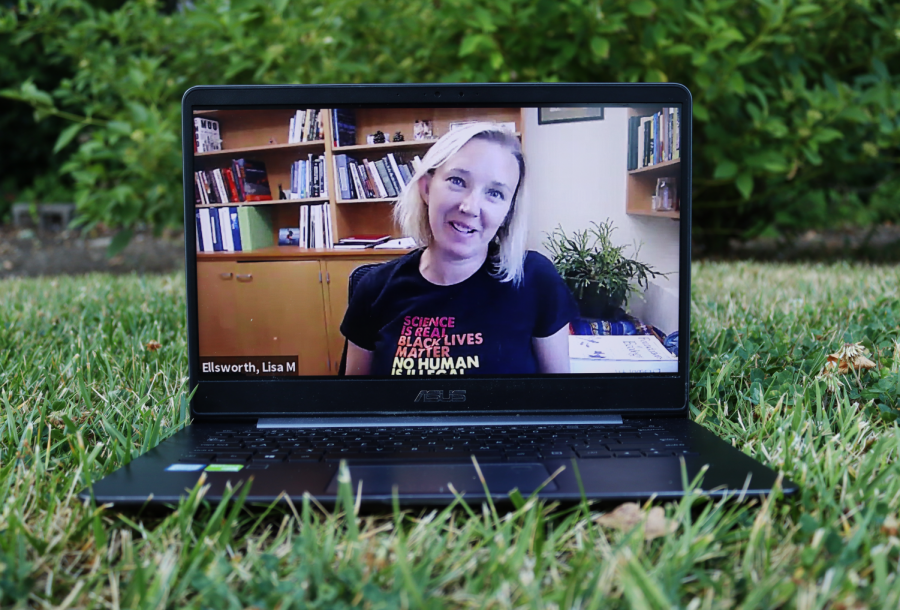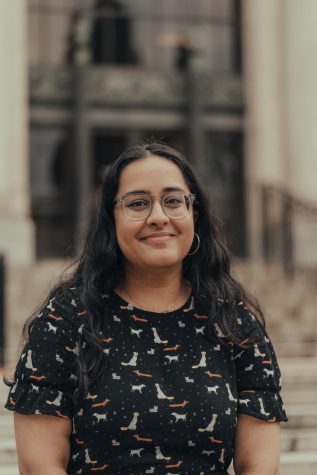OSU faculty writes petition asking university leadership for more caregiver support
July 30, 2020
Correction: A quote by Susanne Brander has been edited to provide more clarification about the university’s response to the petition.
Faculty members created a petition to provide Oregon State University leadership with concrete suggestions regarding caregiver resources for OSU community members who are in need of more support due to COVID-19.
Will White, assistant professor in the Department of Fisheries and Wildlife and the Coastal Oregon Marine Experiment Station; Lisa Ellsworth, assistant professor in the Department of Fisheries and Wildlife; and Susanne Brander, assistant professor in the Department of Fisheries and Wildlife and ecotoxicologist are a few of the faculty members who contributed to the development of the petition.
Brander is part of a group called SciMoms, part of an international organization, 500 Women Scientists, that supports underrepresented minorities in science. SciMoms wrote an op-ed about issues facing working parents a few months ago, said Brander.
“This petition, I think, is kind of stimulated by the response we got to that op-ed and to other responses we’ve been seeing across the country from other universities; friends that I’ve talked to who’ve seen challenges when parenting during COVID, or have seen a lack of child care,” Brander said.
White added the petition effort was also catalyzed by communication from university administration about making plans to reopen research labs and prepare for in-person teaching in the fall, without any mention of plans of child care for working parents.
“You know, many of these children are OSU families and there’s a frustration that there’s not been any sort of communication—we don’t perceive that there’s been any communication—between the school district and OSU, and it’s a lot of the same people,” Ellsworth said.
Ellsworth noted she and the other faculty members involved with the creation of the petition have children, but it is important to be inclusive. Caregiving can include caring for disabled family members and aging family members because with COVID-19, Ellsworth said, there are many kinds of situations where caregiving is challenging.
“It’s an even bigger concern for people who are single parents or giving caregiving to an elderly parent for example,” Brander said.
Brander hopes this petition will motivate OSU to think more concretely about solutions regarding caregiving, she said.
“Since we put out the petition the administration has really done a good job of looking at what the on-the-ground impacts are going to be. We offered some potential suggestions, and those aligned with solutions the university was already considering. We hope the petition will lead to even further discussion moving forward,” Brander said.
Ellsworth pointed out that people at higher levels of leadership may be more removed from the kind of situation many caregivers are in. This petition is a way to show leadership the realities of caregivers in the OSU community, Ellsworth said, and to offer tangible ways for the university administration to help.
Ellsworth said some of the petition process came out as frustration on social media, as the balance between work and family could become a little overwhelming.
“You know, it’s just kind of the chaos that we’re all feeling and trying to do something with it and come up with solutions we could offer,” Ellsworth said.
In some ways, said White, the faculty involved with the creation of the petition looked at caregiving in a broader scope beyond the COVID-19 crisis. They considered how OSU interacts with faculty and student parents and the way the demands of parents are handled in job assessments and similar opportunities.
“So for example, one of the first things that they did, in theory as a help to parents who are faculty is say, ‘okay, if you need additional time to go for tenure, just take additional time.’ And that’s basically telling us, ‘okay, you can put off getting a promotion while you scramble to get your career going, at a time of a global pandemic when you have no child care and funding rates are crashing,’” White said.
According to White, though there are immediate consequences to their ability to teach classes remotely in an efficient manner because of caregiving issues, there are also subtle impacts on their work life—like remote class meetings being interrupted by their children.
According to White, these perceptions will lead to longer-term effects on all parents’ careers, whether they are students or faculty, because of the idea they are not able to be effective employees because they are parents.
“Well, those of us who are trying to multitask in terms of splitting our time between caregiving and teaching and research are not doing all of those things to our full potential. So that’s going to impact our ability to teach well, it’s gonna impact our ability to be as productive as possible with our research, it’s gonna impact our ability to bring in research funding,” Ellsworth said. “For people who are students, it’s gonna impact their grades, it’s gonna impact their potential to get jobs out of their degree programs, it’s gonna impact their potential to go to graduate school if they want to. So there’s this ever-increasing divide between groups. We see this a lot of times with underrepresented groups and single parents are at very significant risk right now, because they’re trying to do all this alone.”
OSU is ultimately losing productivity from these members of the community, said Ellsworth. She said for individuals who are already more marginalized, the divide is getting larger, and that is a real risk when OSU is very vocally trying to promote diversity and inclusion.
Ellsworth said in places where faculty have privilege, like classrooms and labs, students should know that they can go to faculty for support if they’re struggling with childcare issues.
“Bring your kids to my classes, I don’t care. If you wanna turn things in late because there’s a national pandemic and you have childcare issues, fine. [That way] students know we support them too, in the same way we are asking the upper administration to support us,” Ellsworth said.
Amy Luhn, the director of the OSU Family Resource Center, provided context to help clarify the problem with child care in OSU and the country.
“So, what’s happened over the years is that we have more and more children who are in care. And our country, unlike other countries, we never put a stake in the ground; that this is an important social public good, that we have well cared for and educated children. We don’t value that as a society and a culture, and hopefully, COVID-19 is perhaps going to be that flashing point,” Luhn said.
According to Luhn, many people have been trying to draw attention to the fact that this country needs a system of early care and education in the same way that the country has a public school system.
Luhn described the way OSU provides the building reserve, utilities, maintenance and holds a structural cost center for both Beaver Beginnings and Azalea child care centers. In exchange for that, Luhn said, the vendors hold tuition at a certain level.
Specific to Azalea child care center, Luhn said, “We pay an annual management fee of $166,000—on top of the building, the custodial, the maintenance—to ensure that three things happen. One is that there are high quality supplies and materials, that staff are appropriately compensated for their education, their expertise, and three, that tuition is capped so that infant-toddler care doesn’t cost more than $1300,” Luhn said.
Child care centers on campus have always tried to maintain a 50-50 ratio of students to employees, Luhn said, starting with Beaver Beginnings, which was the first campus child care center.
“There’s a federal grant that’s called CCAMPIS—Child Care Access Means Parents In School—and that’s the easiest way to think about it. If you are a student and you have young children, most likely the only way that you’re going to succeed is if you have child care support. Child care is a basic need for really any working or studying family. And that’s one of the education awareness points that we’ve been trying to make over the years; is that child care is not a lifestyle enhancement. It’s a basic need. So we need to look at it as a basic need, we need to fund it as a basic need,” Luhn said.
It’s important to have those supports in place, Luhn said, or else they leave that demographic out of the party.
“So like students creating progress and change, it’s going to be the voices outside of leadership that help leadership further understand the nuts and bolts of our working family lives,” Luhn said.
Luhn recommends watching this UC Berkeley video that explains the problems with quality child care and education and visiting this link to read more about Oregon’s child care desert.




















































































![Newspaper clipping from February 25, 1970 in the Daily Barometer showing an article written by Bob Allen, past Barometer Editor. This article was written to spotlight both the student body’s lack of participation with student government at the time in conjunction with their class representatives response. [It’s important to note ASOSU was not structured identically to today’s standards, likely having a president on behalf of each class work together as one entity as opposed to one president representing all classes.]](https://dailybaro.orangemedianetwork.com/wp-content/uploads/2025/03/Screenshot-2025-03-12-1.00.42-PM-e1741811160853.png)
























